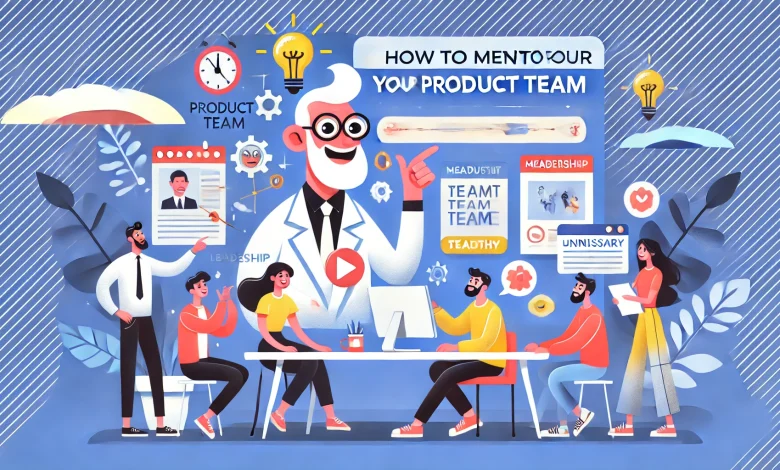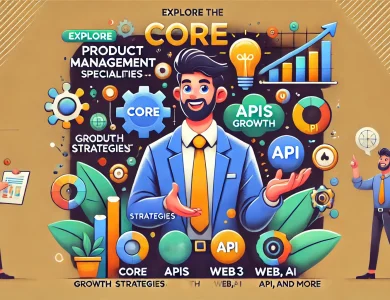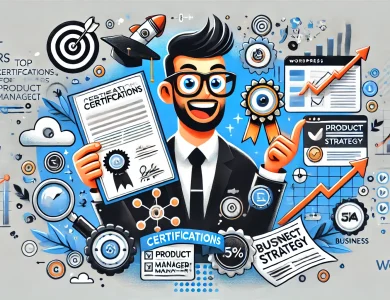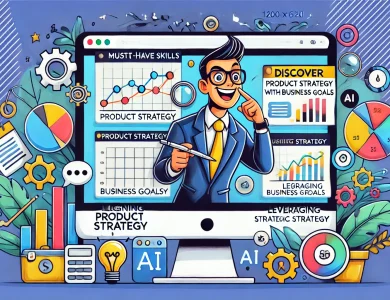How to Mentor Your Product Team: A Strategic Guide for Product Managers

Mentorship is a critical tool in developing high-performing product teams and aligning team success with business outcomes.
As a product manager, your role extends beyond project timelines and deliverables—effective mentorship helps you cultivate leadership, foster innovation, and ensure long-term career development for your team members.
In this article, we’ll explore how to mentor your product team with strategies that range from foundational mentorship concepts to advanced, AI-driven techniques.
The Role of Mentorship in Product Management
Mentorship is essential in helping product teams grow and thrive. As a mentor, you’re not just shaping individuals—you’re cultivating a culture of trust, collaboration, and continuous improvement. Strong mentorship results in better decision-making, more innovative product solutions, and a more cohesive team.
Example: A product manager mentoring a junior UX designer on cross-functional communication can shorten the feedback loop between design and development, accelerating product iterations and improving user outcomes.
Why Product Managers Should Mentor Their Teams
Mentoring your product team leads to multiple benefits:
- Building Trust: A culture of trust enables team members to openly share ideas and challenges, leading to quicker resolutions and more innovative thinking.
- Improving Morale: When team members feel supported, morale improves, leading to better engagement and retention.
- Fostering Continuous Learning: Mentorship creates an environment of continuous learning and self-improvement, which drives both personal growth and product innovation.
Setting Clear Mentorship Goals
To ensure that mentorship is purposeful, set clear goals that align with both individual and team objectives.
Steps to Setting Effective Goals:
- Personal and Professional Growth: Align the team member’s career goals with the overall product team’s objectives. For instance, a goal might be “Improve cross-functional collaboration with the design team to reduce product delivery timelines.”
- Business Impact: Ensure mentorship is geared toward improving product outcomes, like increasing the efficiency of product iterations or improving feature quality.
- Measurable and Actionable: Use OKRs (Objectives and Key Results) or specific KPIs to measure progress.
Creating a Safe and Supportive Mentorship Environment
Effective mentorship requires a psychologically safe space where team members feel comfortable discussing challenges without fear of judgment. A safe environment encourages open dialogue, innovation, and problem-solving.
Best Practices:
- Open Communication: Schedule regular one-on-ones to allow team members to share feedback or challenges.
- Empathy: Lead with empathy by recognizing the pressures and challenges your team faces, and provide constructive guidance.
Balancing Mentorship with Day-to-Day Responsibilities
Balancing mentorship with day-to-day tasks can be challenging, but integrating mentorship into your workflow makes it easier. For example, offering mentorship during product reviews, retrospectives, or strategic planning sessions ensures that mentorship is continuous rather than an additional burden.
Techniques for Integration:
- Mentor During Meetings: Use retrospectives as mentorship opportunities by discussing individual contributions and improvement areas.
- Delegate Mentorship: Encourage senior team members to mentor juniors, promoting peer learning and leadership development.
Tailoring Mentorship to Individual Needs
Mentorship should be customized to fit the specific needs of each team member. Whether it’s honing technical skills, improving communication, or refining leadership abilities, effective mentoring is tailored to individual strengths, weaknesses, and career goals.
Practical Steps:
- Assess Career Goals: Regularly review personal development plans for each team member and align mentorship efforts with these goals.
- Identify Gaps: Provide opportunities for team members to work on projects that challenge their weak spots and develop new skills.
Developing Problem-Solving and Critical Thinking Skills
Mentorship should encourage team members to become better problem solvers and critical thinkers. This helps foster independence and creativity within your team.
Strategies:
- Encourage Ownership: Assign team members to lead initiatives, empowering them to resolve issues and develop solutions.
- Question-Based Learning: Instead of providing answers, ask probing questions that guide team members toward their own conclusions.
Mentoring in Cross-Functional Teams
Cross-functional teams include designers, engineers, marketers, and product managers, and mentoring in this context involves aligning their contributions with the broader product strategy.
Best Practices:
- Facilitate Collaboration: Mentor team members on how to effectively communicate with cross-functional peers and understand the broader context of their work.
- Promote Unified Goals: Ensure that mentorship helps bridge gaps between teams, aligning them with a shared product vision.
Using Data to Support Mentorship
Data-driven insights are valuable tools for tailoring your mentorship strategies. Product metrics, team performance data, and AI tools can help identify areas where team members need additional support.
How to Use Data:
- Monitor KPIs: Use performance metrics such as delivery speed, customer satisfaction, or feature completion rates to track progress.
- Leverage AI: AI tools can provide insights into team performance and help personalize mentorship by identifying knowledge gaps.
Fostering Leadership Skills Within the Team
Mentorship should prepare team members to take on leadership roles, whether it’s leading a project or managing a team. Developing leadership skills ensures that your product team is self-sufficient and can drive projects forward.
Delegation as Mentorship:
- Assign Leadership Roles: Encourage team members to take ownership of product features or lead specific projects, offering guidance but allowing autonomy.
Mentoring for Innovation and Creativity
Product innovation is crucial to staying competitive, and mentorship can drive creative thinking within your team. Encourage team members to challenge assumptions, explore new ideas, and push the boundaries of conventional product development.
Tips for Encouraging Innovation:
- Host Innovation Workshops: Regularly hold brainstorming sessions that encourage out-of-the-box thinking.
- Challenge Assumptions: Teach your team to question existing solutions and explore alternatives.
AI-Driven Mentorship: Enhancing Growth with Technology
AI-powered mentorship tools offer real-time insights into team performance and skill development. Using AI, you can personalize your mentorship approach, helping team members grow based on data-driven recommendations.
Examples of AI-Driven Tools:
- AI Feedback Systems: Use AI to deliver performance reviews based on metrics like productivity, collaboration, or customer satisfaction.
- Learning Platforms: AI can suggest tailored learning paths based on team members’ knowledge gaps and career goals.
Building Emotional Intelligence Through Mentorship
Emotional intelligence (EQ) is essential for team members to collaborate effectively and navigate complex interpersonal dynamics. As a mentor, fostering EQ in your team can improve communication, conflict resolution, and overall performance.
Techniques for Building EQ:
- Self-Awareness Exercises: Help team members understand their emotional triggers and how they respond to stress.
- Empathy Development: Encourage team members to practice empathy by putting themselves in their stakeholders’ shoes.
Conclusion
Mentoring your product team is a powerful way to drive innovation, improve performance, and cultivate leadership skills within your organization. By setting clear goals, personalizing your approach, and using data-driven insights, you can create a mentorship environment that fosters continuous learning, growth, and long-term success for both individuals and the business.




